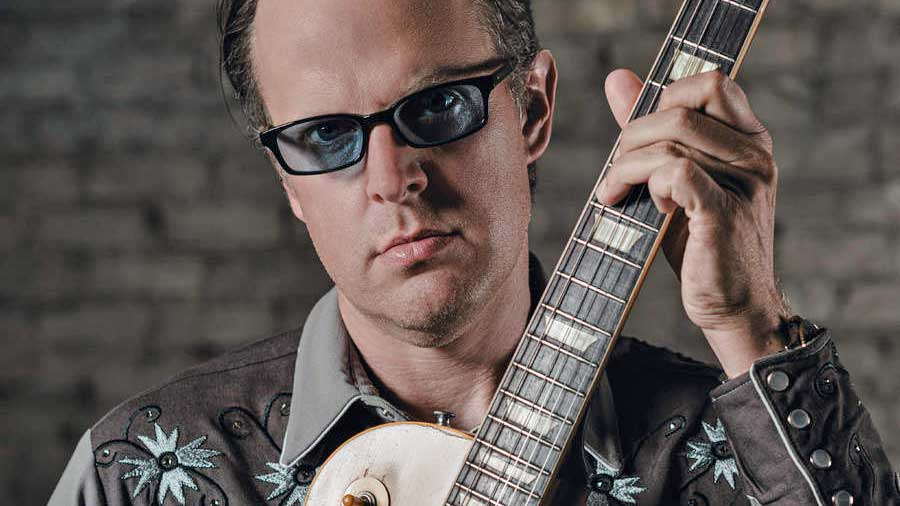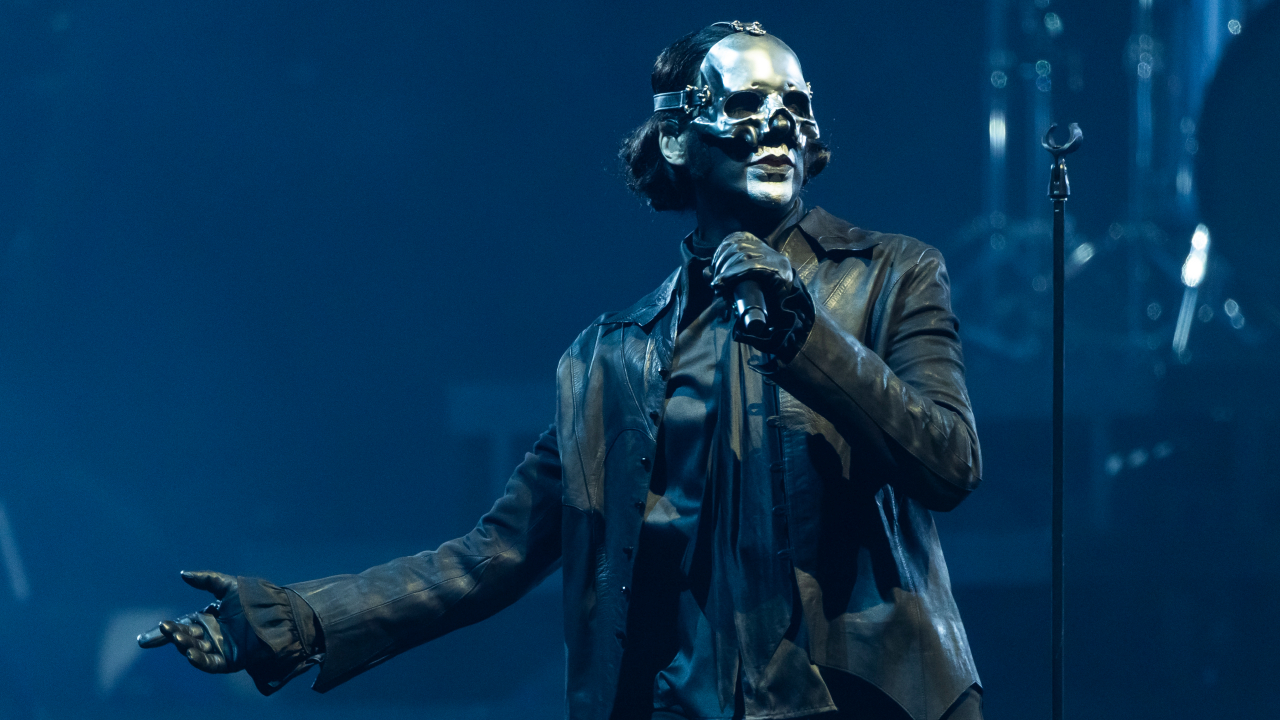Joe Bonamassa interview: dating, cycling, and dealing with trolls
With the passing of time on his mind, blues figurehead Joe Bonamassa tackles the pros and cons of social media, his troubled love life, the future of the genre, and the reason he knows way too much about cruise ships

Five years ago Joe Bonamassa’s biggest fear was failure. Now, at 44, he’s more concerned with time. The rapid passing of years. The inevitability of ageing, and the world’s response to it. The shelf life of the empire he’s built.
“I know there’s a second act in my life,” he says from his tour bus, still buzzing a little from two sold-out nights at Red Rocks amphitheatre in Colorado. “That’s my biggest fear, knowing that people who have worked for me for twenty years will have to find another career.”
Arguably this explains his work-rate of late. Somewhere between his nonprofit Keeping The Blues Alive foundation, producing albums for Eric Gales, Joanne Shaw Taylor and others, and interviewing stars for his Live From Nerdville podcast series, he completed his sixteenth solo studio album.
With roots that predate last year’s Royal Tea record, Time Clocks conveys a sense of urgency through soul-searching tunes and expansive sounds that take in blues, rock, classic prog, funky touches and more.

Nine months ago I thought my career was over
I was cool with it. I looked at places in Montana to start a little antique shop. I had this whole thing planned out. And this notion of time; one day you wake up and people like what you do, the next day you get a birthday cake and a double four and you’re some sort of fucking antique. I don’t get that mentality.
I turned forty four years ago, I can remember that like it was nothing. I’m forty-five next May; that’s half the decade. So, if the second half goes as fast as the first… I am not a lifer. I have until fifty-two or sixty-two to get this thing done. So Time Clocks is more urgent than some of the stuff before, because I feel it moving fast.
Nobody is universally loved or respected
There are misconceptions that I come from a very rich family: false. That all I do is dress up in a suit and sunglasses and parade around the town, going into a pharmacy, buying aspirin: false.
Sign up below to get the latest from Classic Rock, plus exclusive special offers, direct to your inbox!
I’ve also raised a million dollars or more for not only music in schools, but bands that didn’t have a gig last year: true. I know there’s nobody that’s going to be universally loved and universally respected, especially online.
Playing music should always be a simple, enjoyable exchange
The new technique with trolling is they come in under the auspices of, “Well, I know I’m not as good as that person, but here’s my opinion” – so basically, you’re saying you are not qualified to be commenting, but you’re just going to join in the pile-on for fun. It raises the toxicity level of society.
I mean, for as simple as guitar playing is and the exchange of music is, nobody can just sit back and enjoy it because they have to run it through a filter – to even just reconcile what other people will think of them for liking it, online. It’s that way of thinking that’s so backwards [as to] why we play music to begin with. It’s a simple exchange; I came up with a song, do you like it? Yes, no, great, we’ll move on.
Someone threatened to burn my house down
I deleted my Instagram account when they threatened to burn my house down. Instagram goes, “You’ve got to get it back because you have a blue checkmark,” and I go, “Listen, I don’t care if I have a fucking red checkmark, the checkmark’s not the boss of me, these people threatened to burn my house down and they had the address kinda right.”
Social media is a great free marketing tool...
I’ve discovered great players by going, “Who the hell is that guy shredding on Instagram or Twitter?” They come out of nowhere because they don’t have the marketing to put it out on the major media. They start accruing fans of the kind of music they’re playing, and they can start a grassroots marketing campaign, for free, in their bedroom, in their pyjamas. Does that translate to the grandeur of a large stage? No, you have to then become an entertainer. But the rollout, the “Who the hell is that?” – it’s a real advantage having social media.
...but its addictiveness is a problem
It’s when there’s an addiction to it, and you start skewing your art and playing towards the daily dopamine shot. Like, “If I do a fifty-five-second video, it’s going to get more views than a minute and two,” or, “If I do a cool cover, it’s gonna get more views than my original.”
When that becomes more [important] in the psyche than, “Hey, I can play guitar and nobody knows who I am and let’s get it out there…” That’s when, I think, the focus needs to shift to becoming more of an entertainer, or an artist, or a three-dimensional product.
People pay for my solos, but they respond to the songs
For the first ten years of my career as a solo artist, I was a guitar player with two chips on his shoulder, daring people to knock ’em off. [Producer] Kevin Shirley comes in the second ten years, he starts preaching songs and we have a few good ones scattered around the catalogue. Then I had this epiphany around a record we did, Blues of Desperation, and a song called No Good Place For The Lonely.
It was named in Classic Rock as one of the best guitar solos [2016’s ‘100 Greatest Guitar Solos’ feature]. I did it in one take; a mindless, pre-lunch guitar solo. I thought the song was good, but the solo was better. I realised: I’ve established myself as a guitar player, so let me take the audience on a journey and surprise them. As I concentrated on the songs I noticed at the live shows, the response to the material got way better. I can sing the songs with melody and then give ’em the solo that they pay for.
Dating in the music industry has downsides
I try to keep a circle of friends that are not in the industry because I find their lives really intriguing, people who are not judged by everything that they do.
[Classic Rock: You’ve talked about, romantically, wanting to meet ‘Stacey from Accounting’. Is that still something you hope for?] Yeah, that’s the thing. I’ve dated women in the music industry thinking, “This will work out really well,” because, intrinsically, you have a lot in common. Maybe it’s too much of one thing. Plus, if you look at my dating history, the common denominator is that the problem is me. I’m a child who’s been in this business since [I was] a child and really have never had to mature.
I don't have or want kids
I’m not the parenting kind, I don’t have that in me. There’s no right or wrong, it’s just that I choose not to bring another human into the world. That’s another thing about the Time Clocks concept. It’s like, “Well, if you’re going to have kids, you wanna be an eighty-year-old high-school dad?” I don’t want to do that [laughs]. You start looking in the mirror a lot, and you think, “Are you going to be happy if this is it?” Absolutely. If it is all over tomorrow, I had a tremendous run.
The future of the blues is in good hands
To me, the most fascinating personality in the blues right now, by far, is Fantastic Negrito. What he’s doing is so original. It’s just such a cool take on the blues. I really like Chris Buck. He’s a good player. Joanne Shaw Taylor, I just think she’s a superstar of the blues and a much better singer than she’s given credit for. Warren Haynes, Robert Randolph, Robert Cray… The great thing about the blues is that everybody has their own lane.
I know way too much about cruises
The camaraderie among the bands and the friendships that come from those collaborations, by the nature of being stuck on a boat in the Caribbean… Over the course of two or three years you see a community develop, not only among the artists but the fans.
We asked the fans, “Do you want more bands or do you want more stops? Do you want to go to Malta, or do you want Blues Traveler?” Because it’s the same amount of money to park the boat. The slip fee for the day is like some people’s houses.
There's a time and a place to charge money for handshakes
The other thing about the cruises for Keeping The Blues Alive is the charitable aspect. It’s the only time I’ll ever charge for a handshake and a photo, because all the money goes to the charity. We do a hundred-person VIP event and there’s a wine tasting. Yes it’s expensive, but guitar programmes in middle schools have been started with those handshakes and photos. And the money we raised last year literally went to help bands that couldn’t pay their mortgage.
Childhood dreams do come true
As a kid I had a picture of Stevie Ray Vaughan in my room, I had a picture of Eric Clapton from Just One Night, and I had a picture of Howard Reed’s 1955 black Stratocaster – the first Fender Stratocaster ever made – and I cut it out of a Guitar World Collector’s Choice, 1988, with George Lynch on the cover. I now own that guitar. It was all geek stuff, Fender paraphernalia, Gibson paraphernalia. Nothing’s changed other than the level of OCD and the budget.
You can have too much stuff
I have a car thing. It started with one and now I have ten. I have really curtailed the guitar thing. I have so much stuff at this point. My niece and nephew will inherit all this if I get hit by a bus, [and] I do not want a nine-year-old and a six-year-old to have to wade through all this with their parents.
The house [in Los Angeles] is a living, breathing museum. When my friends come over and see it, they’re like, “This is unbelievable. Do you even understand what’s in here?” And I’m like, “You realise I wake up every morning, make coffee and see this stuff every day?” I’m desensitised. I built it.
I don't play guitar at home
I live in a house of guitars, and I don’t play. I’m truly happiest when I’m in New York City, walking by myself. Or riding my bike. I got into bike-riding last year. I will get on my bike, ride up to Central Park and ride around the trail, that’s it. Then, I’m not a musician, I’m not in the public eye, I’m just a fellow cyclist. That’s when I’m truly happy.
Time Clocks is out now via Provogue.

Polly is deputy editor at Classic Rock magazine, where she writes and commissions regular pieces and longer reads (including new band coverage), and has interviewed rock's biggest and newest names. She also contributes to Louder, Prog and Metal Hammer and talks about songs on the 20 Minute Club podcast. Elsewhere she's had work published in The Musician, delicious. magazine and others, and written biographies for various album campaigns. In a previous life as a women's magazine junior she interviewed Tracey Emin and Lily James – and wangled Rival Sons into the arts pages. In her spare time she writes fiction and cooks.
